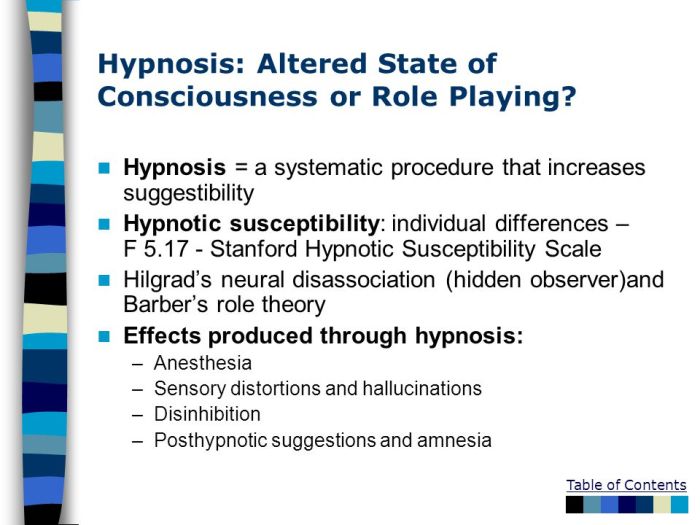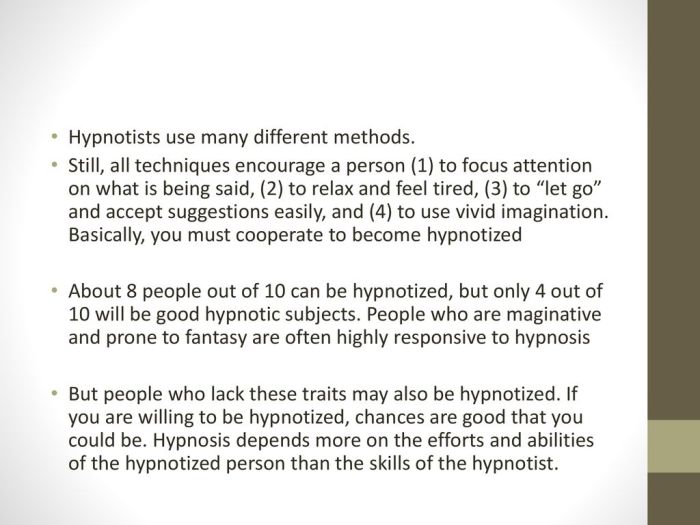How responsive you are to hypnotic suggestions – The susceptibility to hypnotic suggestions varies greatly among individuals, influenced by a complex interplay of factors. This article delves into the methods for assessing hypnotic responsiveness, its therapeutic applications, and the ethical considerations surrounding its use.
How Hypnotic Responsiveness Varies Among Individuals

Hypnotic responsiveness refers to the degree to which an individual can experience and respond to hypnotic suggestions. This responsiveness varies widely among individuals, and several factors influence this variation.
Factors Influencing Hypnotic Responsiveness
- Personality traits:Certain personality traits, such as high hypnotizability, openness to experience, and low neuroticism, are associated with greater hypnotic responsiveness.
- Beliefs and expectations:Individuals who believe in hypnosis and expect to experience hypnotic phenomena are more likely to be responsive.
- State of mind:Hypnotic responsiveness is influenced by an individual’s state of mind, including their level of relaxation, concentration, and motivation.
- Physical factors:Physiological factors, such as fatigue, stress, and substance use, can affect hypnotic responsiveness.
Methods for Assessing Hypnotic Responsiveness

Various methods are used to assess an individual’s responsiveness to hypnosis.
Standardized Tests
- Stanford Hypnotic Susceptibility Scale (SHSS):A widely used test that measures hypnotic responsiveness through a series of standardized suggestions.
- Harvard Group Scale of Hypnotic Susceptibility (HGSHS):A group-administered test that assesses hypnotic responsiveness based on responses to suggestions.
Observational Methods
- Clinical observation:Trained clinicians observe an individual’s responses to hypnotic suggestions during a hypnotic session.
- Behavioral measures:Researchers measure specific behaviors, such as eye movements or muscle relaxation, to assess hypnotic responsiveness.
Applications of Hypnotic Responsiveness
Hypnotic responsiveness has therapeutic and non-therapeutic applications.
Therapeutic Applications
- Pain management:Hypnosis can reduce pain perception and improve pain tolerance.
- Anxiety reduction:Hypnotic techniques can help individuals manage anxiety and phobias.
- Habit change:Hypnosis can be used to promote positive behaviors and break negative habits.
Non-Therapeutic Applications
- Performance enhancement:Hypnosis can enhance performance in sports, public speaking, and other activities.
- Entertainment:Hypnosis is used in stage shows and demonstrations for entertainment purposes.
Ethical Considerations in Hypnosis

Ethical guidelines are essential when using hypnosis.
- Informed consent:Individuals should fully understand the purpose and potential risks of hypnosis before consenting to a session.
- Client autonomy:Hypnotists must respect client autonomy and avoid using hypnosis to control or manipulate individuals.
- Minimizing harm:Hypnotists should take precautions to minimize potential risks and ensure the well-being of clients.
Future Directions in Research on Hypnotic Responsiveness: How Responsive You Are To Hypnotic Suggestions

Research on hypnotic responsiveness continues to evolve.
Emerging Areas of Research, How responsive you are to hypnotic suggestions
- Neuroimaging studies:Using neuroimaging techniques to explore the neural mechanisms underlying hypnotic responsiveness.
- Genetic influences:Investigating the role of genetic factors in individual differences in hypnotic responsiveness.
- Cultural variations:Examining how cultural factors influence hypnotic experiences and responsiveness.
FAQ Overview
What factors influence hypnotic responsiveness?
Individual differences in personality traits, beliefs, expectations, and cognitive abilities can impact susceptibility to hypnosis.
How is hypnotic responsiveness measured?
Standardized scales, such as the Stanford Hypnotic Susceptibility Scale, are commonly used to assess an individual’s level of responsiveness.
What are the therapeutic applications of hypnotic responsiveness?
Hypnosis has been effectively employed in pain management, anxiety reduction, habit change, and performance enhancement.
What are the ethical considerations in using hypnosis?
Informed consent, protection of client autonomy, and minimizing potential risks are crucial ethical principles to adhere to.